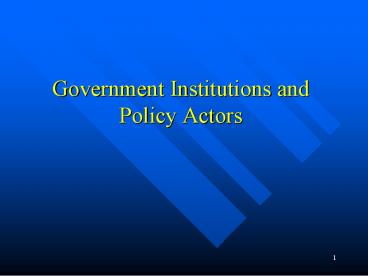Government Institutions and Policy Actors - PowerPoint PPT Presentation
1 / 15
Title:
Government Institutions and Policy Actors
Description:
Government Institutions and Policy Actors. 2. Outline. Growth of government ... Important (famous) members. 13. Informal Actors: Policy Subsystems ... – PowerPoint PPT presentation
Number of Views:1046
Avg rating:3.0/5.0
Title: Government Institutions and Policy Actors
1
Government Institutions and Policy Actors
2
Outline
- Growth of government
- Structure of policymaking
- federalism
- separation of powers
- subgovernments/policy subsystems
- Public opinion and public policy
- Interest groups
- Policy stalemate and improving policy capacity
3
Growth of Government
- Growth of nation and population
- Increased complexity of society
- Regulation of business
- Protection of social welfare
- Role of U.S. in the world
- Citizen demands
4
Government Institutions and Policy Capacity
- Complexity and fragmentation
- Federalism
- State variation and policy capacity
- Separation of Powers
- Legislative
- Executive
- Judiciary
- Informal Actors
- Public opinion
- Interest groups
- Subgovernments
5
Federalism
- Evolution of federalism
- dual federalism
- cooperative federalism
- Continuing controversies, especially over federal
dollars and state expectations - State variation in policy capacity
- The pros and cons of devolution of authority to
the states
6
Separation of Powers
- Power is shared among three branches
- legislature, executive, and judiciary
- Founders were concerned with possibility of
government tyranny - Has added to the complexity of governing
- Has added to the challenge of building consensus
for policy action, especially between the
legislature and executive
7
Separation of Powers Policymakers
- Legislature lawmaking
- bicameral system
- committee system (division specialization of
labor) - Executive law enforcing
- president/bureaucracy involved in policy
development - bureaucratic structure
- Judicial law interpreting
- reactive rather than proactive
- judicial review
8
Organizational Formats
- Legislative organizations (e.g., committees,
individual members, party leadership) - Executive Office of the President (EOP)
- executive departments (cabinet-level
departments) - subagencies
- independent executive agencies (e.g., EPA)
- independent regulatory commissions
9
Informal Actors Public Opinion
- Public opinion
- is important in a democratic system
- is fleeting
- many people are inattentive to politics and
policy - can be voiced in numerous ways
- can have an impact, if people willing to take the
time/effort - can lead to interest group formation and activity
10
Informal Actors Interest Groups
- Important in politics, governance, and
policymaking - Lobbying all branches, both for/against
policies - money for elections
- use of media
- information (substantive and political)
- litigation
- direct contact w/policymakers
11
Interest Groups (cont)
- Increase in number of groups claiming broad based
representation public interest - Outnumbered by business type groups
- Economic groups easier to form
- Free Rider problem
12
Interest Group Power
- Size of membership
- Distribution of membership
- Resources
- Ability to form coalitions
- Legitmacy
- Ability to obtain access
- Important (famous) members
13
Informal Actors Policy Subsystems
- Informal settings in which policies are made
- Have been called many different things
- subgovernments
- issue networks
- iron triangles
14
Iron Triangles
Bureaucratic Agency
Policy Support
Budget Programs
POLICY
Interest Group
Congressional Committee/Sub
Support Money
15
Policy Stalemate and Capacity
- Why does stalemate occur?
- Constitutional design and divided govt
- Complex problems
- Public opinion and consensus
- Organized interests
- Ineffective political leadership
- Improving capacity

